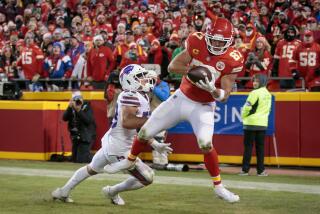Pro Football / Bob Oates : NFL Finally Plugging In to Electronic Aid for Officials
- Share via
PHOENIX — The electronic age may finally have reached the National Football League.
After maintaining for more than 10 years that they couldn’t use instant replays to improve their officiating, most of the NFL’s club owners agreed here Tuesday that something like that should be done.
Members of the competition committee spoke of the electronic officiating during a break in the NFL’s annual meeting. Still undetermined, however, is just what kind of electronic officiating to employ.
Miami Coach Don Shula said that most likely the NFL will use commercial television’s instant replay pictures this season only to avoid obvious blunders.
“A guy upstairs (an extra official) would ask the officials on the field to re-huddle (if they have made a mistake),” he said.
In that setup:
--The upstairs official would watch a television set to monitor the officiating crew.
--When he saw a possible error of judgment, he would signal the crew to hold everything while he took another look.
--And if he found--after watching several replays--that the field officials had made an obvious mistake, he would reverse them.
Shula stressed that the plan--which is similar to the United States Football League’s--hadn’t yet been adopted by the league. So far it exists only as a proposal by the competition committee, of which he is a member.
Other owners and coaches have proposed other plans. There is unity, Shula said, only on the idea that the league should get moving on something.
“The plan the owners decide on will be tried, I feel sure, during our nationally televised games this summer,” he said.
Shula said it’s not possible to solve every officiating argument with a TV camera. But in the cases in which fans all over the country have seen a fumble that the officials missed--or other glaring errors--the NFL is getting ready to ask for assistance.
The competition committee said that judgments will not be based on so-called challenges by coaches. Nor will the kind of calls reviewed necessarily be limited.
“Our only goal is to avoid the big, obvious mistake if we can,” Shula said.
In another electronic area, the NFL is still considering helmet radios for its players, the competition committee said.
Having experimented with miniature transmitters and receivers during pregame warmups last year in Minnesota’s domed stadium, the league is planning a five-week experiment with two teams thi1931506549 The object of helmet radios is to make it possible for the players to hear the quarterback at times when crowd noise would normally drown out his signals.
Two Seattle and two San Francisco quarterbacks will wear the transmitters in their helmets during the exhibition season, and eight Seahawks and eight 49ers will wear the receivers.
If the experiment succeeds, the competition committee said, the league may adopt the equipment for all 28 teams in 1986.
Models of the helmets and miniature radios planned were exhibited at Tuesday’s meeting.
NFL Notes
The league has decided against a new rule specifying only 15 yards for pass interference (except in flagrant instances)...”It’s impossible to judge what’s flagrant and what isn’t,” Don Shula said...Instead, the competition committee is recommending rules that would give defensive and offensive players alike the right to a thrown ball--regardless of the extent of contact--provided they’re looking at the ball...Most of the other proposed rules changes are aimed at shortening NFL games from an average of 3 hours 9 minutes to less than 3 hours this season...The coaches don’t seem to object to the possibility that radio helmets might be used to transmit signals from the bench to the quarterbacks, but they’re worried about other potential uses. Two examples: A press box assistant coach could inform the passer about an open receiver he’s overlooking. A quarterback could instruct downfield receivers where to scramble or where he’s scrambling. Thus it isn’t open and shut that radio helmets will be authorized for regular-season use.
More to Read
Go beyond the scoreboard
Get the latest on L.A.'s teams in the daily Sports Report newsletter.
You may occasionally receive promotional content from the Los Angeles Times.










